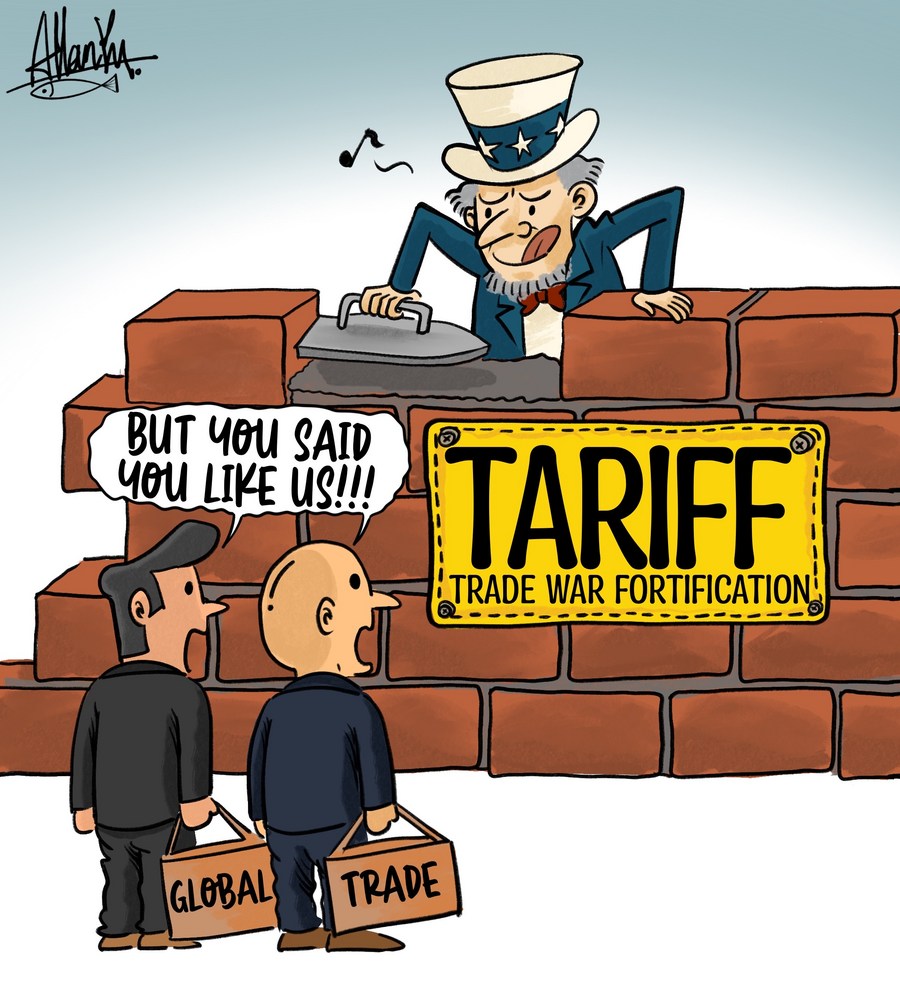U.S.-China Trade Talks: The Unseen Influence Of The Fentanyl Crisis

Table of Contents
The Fentanyl Crisis: A Public Health Emergency and National Security Threat
The fentanyl crisis represents a devastating public health emergency and a significant national security threat to the United States. The synthetic opioid's potency makes it exceptionally dangerous, leading to a surge in overdose deaths. This crisis is not merely a health issue; it carries profound economic and security implications.
- Statistics on overdose deaths related to fentanyl: The CDC reports tens of thousands of fatal overdoses annually directly attributable to fentanyl, making it a leading cause of death among young adults. This number continues to rise alarmingly.
- Economic burden of the crisis on healthcare and law enforcement: The crisis places a tremendous strain on healthcare systems, law enforcement agencies, and social services, requiring substantial investment in treatment, rehabilitation, and law enforcement efforts to combat the opioid epidemic.
- National security implications due to drug trafficking and organized crime: The illegal fentanyl trade fuels transnational organized crime, creating instability and posing significant national security risks through its connections to other illicit activities.
- The role of precursor chemicals sourced from China: A crucial element of the fentanyl crisis is the reliance on precursor chemicals sourced primarily from China. These chemicals are essential for the synthesis of fentanyl, highlighting China's unwitting or willing role in the supply chain.
China's Role in the Fentanyl Supply Chain
While China has taken steps to control the export of certain fentanyl-related precursors, the reality is a complex and often opaque supply chain. The sheer volume of chemical production in China, coupled with regulatory loopholes and challenges in international cooperation, has allowed significant quantities of these precursors to reach illicit manufacturers.
- Loopholes in existing regulations: Despite efforts to tighten regulations, loopholes still exist, allowing precursor chemicals to be diverted from legitimate to illicit use. The sheer scale of chemical production in China makes effective oversight a significant challenge.
- Challenges in tracking and intercepting shipments: Tracking and intercepting shipments of precursor chemicals is incredibly difficult due to the volume of legitimate trade and the sophisticated methods employed by traffickers. International cooperation is crucial but often hampered by jurisdictional issues and differing priorities.
- Involvement of Chinese chemical companies and the complexity of the supply chain: The complexity of the supply chain involves numerous intermediaries, making it difficult to pinpoint responsibility and take effective action. Some Chinese companies may be directly or indirectly involved in the supply of these precursor chemicals.
- Challenges of international cooperation in addressing this issue: Effective international cooperation is hindered by varying legal frameworks, enforcement capabilities, and political priorities. Building trust and coordinating effective strategies across nations is a critical hurdle in addressing the fentanyl crisis effectively.
The Pressure on U.S.-China Trade Negotiations
The fentanyl crisis exerts considerable pressure on U.S.-China trade negotiations. The U.S. government is increasingly leveraging trade policy as a tool to address China's role in the fentanyl supply chain. This creates a complex dynamic, forcing negotiators to balance economic interests with the urgent need to curb the opioid epidemic.
- The use of trade sanctions as a tool to pressure China on fentanyl production: The U.S. has employed, and continues to consider, targeted sanctions against Chinese companies and individuals suspected of involvement in the fentanyl trade as a means of applying pressure.
- Complexities of balancing trade relations with the urgency of the public health crisis: Negotiators face the difficult task of balancing the economic benefits of strong trade relations with China against the urgent public health crisis fueled by the influx of fentanyl.
- Potential countermeasures from China and the resulting political tensions: China’s response to U.S. pressure can range from diplomatic pushback to retaliatory trade measures, exacerbating existing political tensions between the two nations.
Strategies for Addressing the Fentanyl Crisis within the Context of Trade Talks
Addressing the fentanyl crisis requires a multifaceted approach that goes beyond trade negotiations alone. However, trade policy can play a significant role in disrupting the supply chain and holding accountable those responsible.
- Improved international cooperation and information sharing: Strengthening intelligence sharing and coordinating enforcement efforts between the U.S., China, and other relevant countries is essential for identifying and disrupting trafficking networks.
- Strengthening regulations and enforcement on both sides: Both the U.S. and China need to strengthen domestic regulations to prevent the diversion of precursor chemicals and enhance law enforcement capabilities to tackle the illicit trade effectively.
- Investing in drug treatment and prevention programs: Addressing the fentanyl crisis also requires significant investments in prevention, treatment, and harm reduction programs within the U.S. to combat the opioid epidemic at its root.
- Exploring alternative supply chains for precursor chemicals: Diversifying supply chains for precursor chemicals can reduce reliance on China, mitigating the risk of illicit diversion.
- Focusing on targeted sanctions against specific Chinese companies involved in fentanyl production: Targeted sanctions can be a powerful tool to disrupt the supply chain by directly targeting companies and individuals known to be involved in the production and trafficking of fentanyl precursors.
Conclusion
The inextricable link between the U.S.-China trade talks and the devastating fentanyl crisis is undeniable. Addressing this complex issue requires a combined effort, utilizing a multifaceted approach. International cooperation, stronger regulations, targeted actions against culpable actors, and investment in treatment and prevention are all crucial elements in combating this deadly epidemic. The ongoing U.S.-China trade talks must seriously address the fentanyl crisis. Effective solutions require a combined effort focused on disrupting the supply chain, strengthening border security, and fostering international collaboration to combat this deadly epidemic. Further research and public awareness are crucial to finding a lasting solution to this complex issue affecting U.S.-China relations and the health and security of the nation. Let's demand decisive action on the U.S.-China trade front regarding this critical issue.

Featured Posts
-
 Elizabeth Stewart And Lilysilk Partner For A Stunning Spring Collection
May 10, 2025
Elizabeth Stewart And Lilysilk Partner For A Stunning Spring Collection
May 10, 2025 -
 The Geopolitical Shift In The Arctic Greenland Denmark And The Us
May 10, 2025
The Geopolitical Shift In The Arctic Greenland Denmark And The Us
May 10, 2025 -
 Trumps Threat Potential Tariffs On Commercial Aircraft And Engines
May 10, 2025
Trumps Threat Potential Tariffs On Commercial Aircraft And Engines
May 10, 2025 -
 Offres D Emploi A Dijon Rooftop Et Restaurants
May 10, 2025
Offres D Emploi A Dijon Rooftop Et Restaurants
May 10, 2025 -
 Minister Announces Expedited Construction For 14 Edmonton Schools
May 10, 2025
Minister Announces Expedited Construction For 14 Edmonton Schools
May 10, 2025
